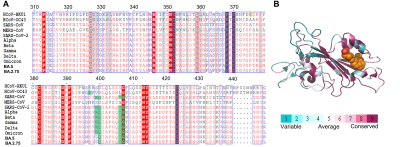COVID-19, caused by SARS-CoV-2, stands as the third most devastating coronavirus outbreak, trailing behind the 2002 SARS-CoV and the 2012 MERS-CoV. The highly contagious nature of SARS-CoV-2 continues to inflict widespread infections, imposing substantial tolls on communities and economies worldwide. As successive variants of concern emerge, the latest threat, Omicron, poses additional challenges by evading vaccination and immune responses.
In a groundbreaking study led by Professor Christiane Schaffitzel from the University of Bristol, an international team delved into the spike glycoproteins present in various coronaviruses. They made a remarkable discovery— a pocket feature within the spike protein of SARS-CoV-2 which they initially identified in 2020, also exists in all lethal coronaviruses, including MERS and Omicron. Intriguingly, this pocket feature is absent in coronaviruses that cause mild infections resembling cold-like symptoms.
According to the research team, their findings suggest that this shared pocket, capable of binding a small molecule called linoleic acid, an essential fatty acid vital for numerous cellular functions, including inflammation regulation and maintaining lung cell membranes, could be exploited for treating all lethal coronaviruses. Consequently, targeting this pocket with a linoleic acid-based treatment could render these viruses vulnerable to intervention.
The implications of this study offer promising avenues for developing pan-coronavirus treatments, leveraging the identified pocket and its binding capabilities with linoleic acid. By capitalizing on this breakthrough, it may be possible to combat the full spectrum of deadly coronaviruses, providing hope for effective interventions in the face of emerging variants.
